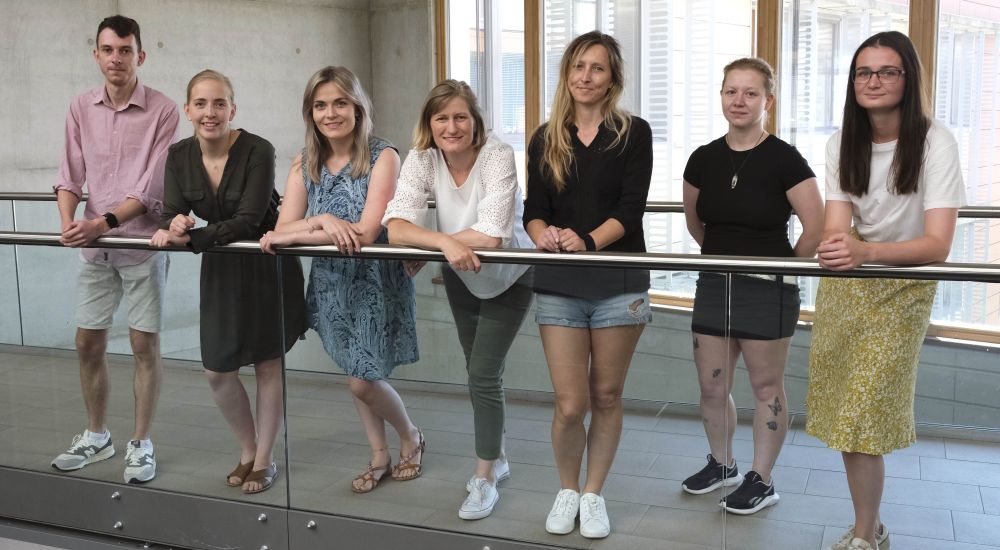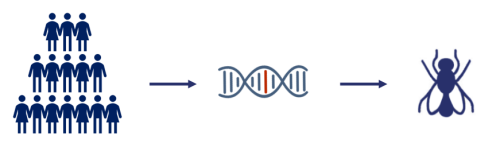Laboratory of Neurogenetics
The research laboratory was founded in 2022 and focuses on genetic and molecular control of neural development and cognition in health and disease.
Head of the laboratory: Mgr. Michaela Fencková, Ph.D.
Lucie Hrádková (technical assistant, lab manager)
Tereza Koníková (technical assistant, researcher)
Pavla Nedbalová (postdoc)
Petra Havlíčková (PhD student)
Anna Koutská (PhD student)
Alžběta Hejlková (MSc student)
Lukáš Martínek (MSc student)
Matyáš Suchý (MSc student)
Aneta Medková (BSc student)
Sera Gruber (BSc student)
MASTER STUDENT WANTED
NEW MASTER PROJECT FOR 2024/2025

WHAT WE DO
We study genes that are important for cognitive function and investigate how can single genetic defects result in dramatic and severe neurodevelopmental disorders, such as intellectual disability (ID) or autism (autism spectrum disorder, ASD).

HOW WE DO IT
We introduce equivalent mutations that are found in individuals with ID or ASD into the genes of a fruit fly, Drosophila. We use various approaches, depending on the type of mutation, such as RNA interference (to mimic loss-of-function), overexpression (to mimic gain-of-function), or CRISPR/Cas9-based genome editing (to model missense and patient-specific variants).
The fruit fly genetic models are inspected for cognitive phenotypes. We mostly focus on habituation, a conserved form of learning that we found to be relevant for ID and ASD. During habituation, a reaction to repeated irrelevant stimuli gradually wanes. They are filtered out and our brain can focus on important matters. A typical example is learning to ignore the sound of a ticking clock. Habituation protects our brain from information overload and it is required for higher cognitive functions, such as memory. It can be assessed in both ID/ASD individuals and their Drosophila models, which makes it suitable for the investigation of disease mechanisms and treatment targets.
You can read more about genetics, molecular control and clinical relevance of habituation learning in our review.
Just as the human brain gets used = habituates to clock ticking, fruit flies can suppress their jump response to a repetition of a light-off stimulus. In the beginning, they perceive it as a danger and respond with a jump. After few repetitions, they learn that it does not cause any harm and stop jumping. Flies with habituation deficit are not able to suppress the response and continue jumping, like in the video below. Our habituation assay is thus called light-off jump habituation. With this assay, we can test 24 flies in less than 30 minutes.
We employ cell- and time-specific tools (Gal4 and split-Gal4, TARGET) to determine neuronal substrates and the developmental origin of gene-specific habituation deficit and genetic interactions to identify dysfunctional pathways and treatment targets. We also look at synapse biology as habituation is related to synaptic function (see example here). To determine the effect of habituation defective missense or patient-specific variants, we use structural modeling and molecular assays. Finally, we attempt to correct the deficits with mechanism-specific drugs.
WHY IS IT IMPORTANT
ID and ASD are major and co-occurring neurodevelopmental disorders. They represent a significant burden for the affected individuals, their families, and health care costs. The underlying mechanisms are not completely understood and there is no treatment to ameliorate the cognitive deficits. ID/ASD have mostly monogenic causes - they are caused by mutations in single genes. To date, we know >1500 such genes. They represent a window into biological pathways and treatment targets but it would take way too long if they are studied in low-throughput models, such as laboratory mice. A high-throughput model is needed. Drosophila is a great opportunity because it has high genetic conservation (75% of disease genes can also be found in fruit flies), high-throughput compatibility, and efficient tools to generate mutations and dissect the molecular mechanisms. With high-throughput light-off jump habituation, we can assess what matters the most - cognitive function. Established human habituation protocols will facilitate the translation of this knowledge to treatment trials.